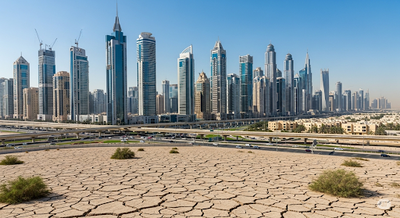TL;DR:
- The World Bank projects 3–4.7% GDP growth in
GCC countries during 2025–26, led by non‑oil sectors such as tourism, logistics, and finance. - GCC freshwater supply is extremely low, renewable water per person often falls below 100 m³/year and climate change could cut GDP by 6–14% by mid‑century without proper action.
- GCC nations are boosting water recovery efforts (e.g. Dubai cut system losses from 42% to 4.6%), desalination expansion, and regional MENA investment in policy-driven water infrastructure. Balancing rapid non‑oil growth with water sustainability is the region’s next big challenge.
As Gulf nations charge ahead with economic diversification beyond oil, a less visible yet critical threat looms: water scarcity. With the World Bank forecasting GDP growth of up to 4.9% for the GCC in the 2025, experts warn that this expansion is precariously underpinned by dwindling water resources, exacerbated by climate change and rising consumption. While desalination plants and sustainability pledges abound, the Gulf’s pursuit of non-oil prosperity could falter unless water security becomes an integral part of the region’s growth strategy.
Growth Beyond Oil: A Regional Shift
While Gulf economies remain heavily tied to hydrocarbon exports, recent signals show a successful pivot:
- The World Bank forecasts non‑oil GDP growth of ~4.6% in 2025–26, outpacing expected oil sector contraction.
- A Reuters poll projects national growth rates from 3.9% (Saudi) to 4.7% (UAE) in 2025, with non‑oil activity as the engine.
- Exports and domestic investments are expanding in sectors like tourism, logistics, finance, real estate, healthcare, and education.
This shift reflects sustained government efforts under national visions; Saudi Vision 2030, UAE Centennial Plan, Qatar National Vision, and Oman Vision 2040 spurred by increasing non‑hydrocarbon investments and globe-facing business ecosystems.
Catalysts of the Economic Mix
Several key developments drive this transformation:
- Mega‑projects & tourism: These contribute significantly through infrastructure and service sector jobs particularly in Saudi’s NEOM and UAE’s Expo‑linked investments.
- Finance & logistics: GCC nations are strengthening their roles as regional hubs seen in Dubai’s DIFC expansion, Qatar’s financial reforms, and Bahrain’s post-oil banking prominence .
- Healthcare & education: Addressing domestic demand and emerging as exportable services to the broader MENA region.
- SMEs & innovation: Startup ecosystems are accelerating in all GCC countries, reducing reliance on oil revenues.
Water Stress: The Hidden Constraint
Despite growth successes, water scarcity remains a perilous bottleneck:
- GCC renewable water per capita as per the World Bank is well under the 500 m³/year “scarcity” threshold, often falling below 100 m³/year.
- In some GCC nations, domestic water use exceeds 500 litres/person/day, which is very high than the global average.
- Climate projections indicate further GDP losses, 6–14% by 2050 due to reduced water access and related shocks .
Consequences span agriculture disruption, urban service stress, and heightened reliance on desalination exposing energy-water-economic vulnerabilities.
GCC Responses: From Desalination to Governance
Governments are taking multiple actions to address the water challenge:
- Desalination leadership: Gulf nations produce ~50% of global desalinated water. World Bank reports show that Saudi’s SWCC accounts for 20% of global capacity.
- Efficiency gains: Dubai Electricity & Water Authority slashed non-revenue water from 42% to 4.6% by 2023 through infrastructure upgrades.
- Reform & policy innovation: GCC states are implementing water pricing, reuse, leakage reduction, and public–private partnership pilots .
- Multilateral support: World Bank and UAE-led initiatives like the MBZ Water XPRIZE accelerate funding for sustainable desalination technology.
Risks & Opportunities Ahead
Risks
- Environmental: Brine discharge impacts marine life; desalination raises energy and emissions intensity.
- Financial: Water infrastructure requires massive investment (~$130–140 billion annually in MENA), roughly double current levels.
- Coordination gaps: Divergent regulations, funding priorities, and water systems weaken regional resilience.
Opportunities
- Green tech exports: Innovation in water membranes and smart meters could be GCC export drivers.
- Job creation: The water and sanitation sector could generate thousands of domestic roles through infrastructure development .
- Regional cooperation: Public–private partnerships and knowledge sharing through GCC integration can strengthen sustainability and unify markets.
Policy Recommendations
To sustain non‑oil momentum amid water risks, GCC governments should:
- Raise water prices & eliminate subsidies to reduce waste.
- Invest in smart infrastructure like metering, pumps, and public awareness campaigns .
- Promote decentralised reuse systems for agriculture and urban cooling.
- Expand private-sector roles in cost-sharing and O&M through PPP frameworks .
- Coordinate regionally on desalination standards, brine management, and contingency planning via GCC bodies .
The GCC’s economic rebalancing through tourism, trade, tech, and services is gaining momentum, with non‑oil growth forecasted at 4–5% annually in 2025–26. However, water insecurity threatens this trajectory. Without rapid efficiency reforms, sustainable desalination, and regional integration, growth could be constrained, GDP could decline mid-century, and public finances may be strained. By integrating water-focused policies and investments into economic planning, GCC nations can ensure their non‑oil boom remains resilient, inclusive, and environmentally secure, anchoring prosperity in a desert region increasingly defined by climate urgency.







